Creative Sound Blaster Audigy FX 5.1
Set Lowest Price Alert
×
Notify me, when price drops
Set Alert for Product: Sound Blaster Audigy Fx Pcie - $49.84
Last Amazon price update was: October 31, 2024 07:09
×
Product prices and availability are accurate as of the date/time indicated and are subject to change. Any price and availability information displayed on Amazon.com (Amazon.in, Amazon.co.uk, Amazon.de, etc) at the time of purchase will apply to the purchase of this product.

Creative Sound Blaster Audigy FX 5.1
Original price was: $65.25.$49.84Current price is: $49.84.
Creative Sound Blaster Audigy FX 5.1 Price comparison
Creative Sound Blaster Audigy FX 5.1 Price History
Price History for Sound Blaster Audigy Fx Pcie
Statistics
| Current Price | $49.84 | October 31, 2024 |
| Highest Price | $54.06 | October 10, 2024 |
| Lowest Price | $49.84 | August 31, 2024 |
Since August 31, 2024
Last price changes
| $49.84 | October 31, 2024 |
| $54.06 | October 10, 2024 |
| $49.84 | August 31, 2024 |
Creative Sound Blaster Audigy FX 5.1 Description
- Easily converts the PC into a cinematic entertainment system by providing a compelling 5.1 surround sound
- Advanced Audio Processing with SBX Pro Studio, a suite of Sound Blaster audio processing technologies that let you bring out the best in your audio
- Supports Windows 11 and includes both half-height and full-height brackets for most PC builds, as well as the Sound Blaster Audigy Fx Control Panel, a PC software that puts you in full control of the SBX Pro Studio suite of technologies
- 600 ohm headphone amp for high performance, studio grade monitoring
- 106 SNR and 24-bit 192kHz DAC (Playback) and 96kHz ADC (Recording)
Creative Sound Blaster Audigy FX 5.1 Specification
Specification: Creative Sound Blaster Audigy FX 5.1
|
Creative Sound Blaster Audigy FX 5.1 Reviews (7)
7 reviews for Creative Sound Blaster Audigy FX 5.1
Show all
Most Helpful
Highest Rating
Lowest Rating
Only logged in customers who have purchased this product may leave a review.

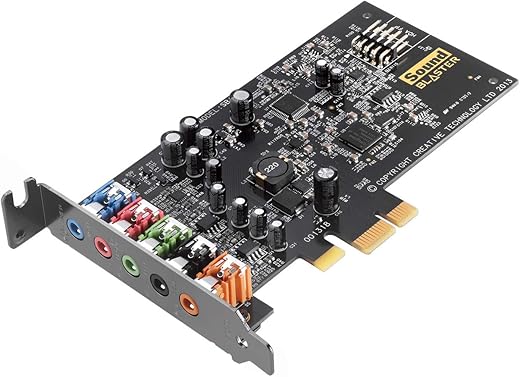
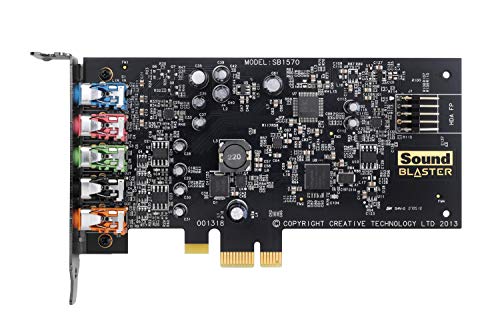
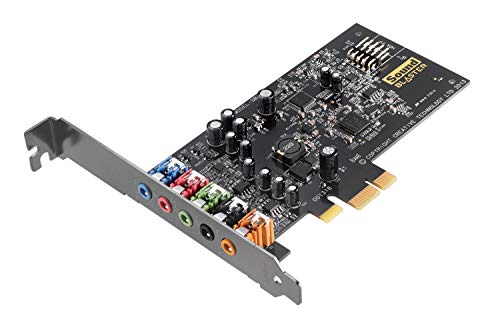
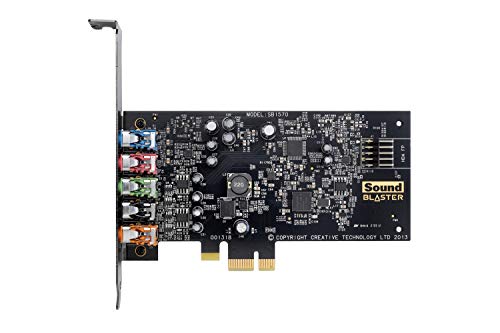
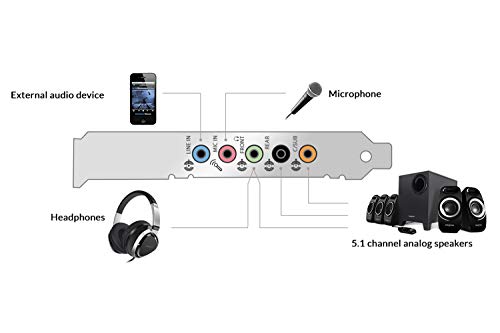

















Adrián –
He leído muchas quejas, principalmente sobre el software de instalación, comentaré mi experiencia & quizás, quizás resuelva el dilema de algunos, ya que de manera general puedo afirmar que el problema no es la tarjeta de sonido ni en sus drivers, el problema está en W10 & en un conflicto con drivers de otro sofware de audio, explico:
Desde W7 he utilizado este producto previamente, mi SO ya utilizaba una tarjeta dedicada de la misma marca pero con interfaz PCI (actualmente obsoleto), por ello no fue problema para W10 detectarla inmediatamente al actualizar el hadware de mi equipo con una nueva placa madre. En el primer arranque trabajó excelente, el problema se detectó cuando realicé alguna configuración del sistema que requiriera reinicio que no tenía que ver con la tarjeta de sonido. Al apagar el equipo para prenderlo al siguiente día, el sonido se fue de modo que al subir el volúmen el “100%” vagamente se escuchaban las 6 bocinas (5.1) es decir, se escuchaba como si estuvieran mal conectadas, lo cual no era posible ya que la noche previa al montaje del equipo sí funcionaban perfectamente.
Pensé que podía ser el driver por alguna “incompatibilidad” pero no era ese el problema, al menos no con con los drivers de la tarjeta, de hecho el primer problema de compatibilidad general (si lo hay) radica en que desde que se lanzó W10, siempre ha tenido problemas con tarjetas dedicadas de sonido, siempre. Muchos usuarios han reportado este tipo de problemas dese hace ya varios años pero Microsoft jamás & nunca le dio solución a este tipo de problemas & es un hecho que hay gente que actualmente pasa por lo mismo.
Ahora bien, intenté reinstalar los drivers desde el panel de control, usando el disco como fuente pero el sistema no instaló nada, es decir ya estaba bien, no eran necesarios; entonces, al no ser ese el problema principal, desmonté la tarjeta, volví a instalarla & pasaba lo mismo pero descubrí el problema real. Si tienes drivers instalados de sonido ajenos a los de la tarjeta Sound Blaster (Realtek por ejemplo), ¡desintálalos! Quita cada uno de ellos exceptuando aquél que se relacione con el video nativo o dedicado, ya sea de tu procesador o tarjeta de video & solamente deja los drivers de la tarjeta de sonido Sound Blaster.
RESULTADO: desinstalen todos los drivers que tengan por defecto del audio nativo de la placa madre que tengan & solamente instalen los de la tarjeta Sound Blaster. Eso es todo.
Soy melómano & audiofilo por ello tenía que buscar la manera de que funcionara & puedo decir que el sonido en formatos “lossless”, DTS etc. es soberbio, es una exquisitez al oído si eres audiofilo pero, si lo que escuchas son formatos en .mp3 almacenado o por medio de aplicaciones prepagadas no es para ti este tipo de expansiones de sonido.
Brian –
Sounds great and software is easy to use
C. Weaver –
Once again I have installed a Sound Blaster card for my sound device on my new PC. Over the years, I’ve used SBs as I’ve usually found them to work well and provide the best sound on my PCs. I brought a new Dell, and it came with on board sound and graphics. As I had had some experience with on board graphics before, I have usually replaced the graphics with a drop in board as it gave me the best performance for the my games which I did this time. This time the sound was pretty good on the on board sound. I, at first, didn’t notice any of the normal things I didn’t like about on board sound. It seemed pretty good. I didn’t note any of the issues I had seen before. (Like back ground noise, or game problems, etc.) In fact, the sound was nice thru my 5.1 speaker system. I then started noticing small things. First, some games seems not to sound right and on others I had trouble getting the sound to work right. I also started noting a small amount of background static that I hadn’t heard before. It wasn’t very pronounced or loud but it was there just under the surface so to speak. I also noted that on high listening level that the sound somewhat distorted and sounded a bit “shattered” unless I turned the volume down a bit. (The older system I had had a SB Audigy in it and although you could drive the speakers to distortion it took a really high volume level setting to do it.) So after going along a bit and finding these things out, I decided to do what I had always done…..get a SB. I chose this card as it fit the bill for what I want. A good card at a good price that has the features I want. (It had to have 5.1 connectively and be able to handle my 5.1 speaker system first of all and the reviews seemed good.) After getting the card in, I proceeded to pulled the new system out and crack the case to install it. I found that my Inspiron case had two slots this card could fit in but the bottom slot was covered over by the GT-730 graphic card’s heat sink/fan array and that only left the top slot which this card fit into without a problem. (I had already uninstalled the on board sound’s driver and disabled it in the BIOS before I shut down the system to pull it.) I reconnected all the stuff to the system and cranked it up. (I had also dropped 16 gigs of RAM in too.) Everything came up OK, and it booted into Windows with no problem. I installed the included CD’s drivers and checked out the installation. Things seemed to be working OK. As is my usually routine, I registered the card thru Creative’s Web site and let it check for updated drivers. None found. I then decided to see if my decision on this card. was right. I checked out the 5.1 set up and all the tests seem OK, including the each speaker ID test. I then cranked up some games to see. On Remember Me which has some good places to check the bass and for distortion at high volume levels, I found very little, if any, “shattering” or distortion at higher levels than I would normally use to play the game. Also the sound was much better sounding than before and much easier to catch the small sounds that you might miss in some scenes. Bass was less “boomy” and much more solid. I was very happy with what I heard. I also noted that lack of any background static or other noise. A few other things that I noticed. On my on board sound card, I had to set it up in software to handle my 5.1 system. (That is assign rear speakers and the woofer and middle speakers to the mic in and aux in ports on the MB. This seemed to be being done in software by loading an extra driver to handle this items above the normal driver the on board sound processor would normally use. This is OK, but in my experience, it’s better to have hardware ports that are fixed to handle this as the SB Audigy’s ports on the card. When I first looked at the memory set up with the on board sound, there were five sound driver items loaded. It seemed that maybe these were aimed at provide what the 5.1 speaker system needed to work right. After installing the new SB card, I noted only two sound card loads and one of those was fore the new SB software that was included with the card and might be able to be disabled if you decided not to use it! So much less memory to enable your 5.1 sound it appeared. The last things I noted which I found interesting was that the chipset of this card was the same brand as the on board sound but the difference in the way they sounded sure easy to hear! This card is a very good purchase if you want to upgrade your sound a bit and not spend an arm and a leg doing it. A good buy!
3/6/16: Update: Rec’d second card of this type and it’s as good as the first, but there were a few things on this one that sort of put me off. First, no outer shrink wrap on box as is normally the case on new cards. Second, when card’s box was opened, I found that the small slot cover adapter package had been opened. And third, safety anti-static bag of the card itself had been opened and resealed by a piece of tape. These items would indicate to me that this card was opened and removed from the package and was not a factory sealed new card. I have no problem with the card itself as it works great, but if it is sold as a NEW card then it should have not been previously opened and should have the all the factory sealing in tact. It would seem to me that would fit under the classification of a used card rather then new.
GERALD L FLYNN –
A1 4 the $
Felipe –
Tengo problema ya la proble en en equipos al y tengo la misma situacion al subir el volumen a al 50% se distorciona y empeiza a subir y bajar el volumen ya realize intalarla con una actualizacion limpia del sistema operativo, instale los drivers de la pagina directamente, pero sigo con el mismo problema
Jeffrey Braswell –
I recently set up a gaming room, so I was finally able to set up my surround sound properly. I’d been using the spdif out on my motherboard. It’s a 2013 MSI board so it was a little long in the tooth. The spdif stereo signal I had been using when I didn’t have the room to set up for surround was fine, I had completely reasonable sound. My AV receiver is also a little older, thankfully from a time when analog 5/7.1 inputs weren’t confined to the higher end gear like they are now. Anyway, I was totally pumped to finally have access to uncompressed surround sound! Only…. The sound was very weak, my subwoofer would never kick on…. I was very disappointed. If I turned on the “bass management” in the Realtek drivers it… worked. On paper. BUT I had no fine control of the crossover which defaulted to way, way too high a frequency and made my speakers sound even worse. No amount of googling was able to offer me any answers. Everyone was saying onboard audio was fine, but I had to do something. So I bought this card. As I read here, I disabled my onboard audio in the bios and installed this card. Right out of the gate it worked! But wait… Still no sub worth speaking of and I couldn’t find any crossover settings in Windows 10. I tried to install the Creative software sans drivers hoping it would give me access to that setting without goofing anything up. It wouldn’t detect any compatible hardware. I crossed my fingers and installed the Creative drivers, hoping these relatively old drivers didn’t conflict with Windows 10. Thankfully that was not the case! Everything worked great! The software let me adjust my crossover setting and everything. But wait, the sub still wasn’t meeting my standards. What the heck? This last one was a goof on my part, it seems the crossover doesn’t really matter if you have your speakers set to full size. I turned that off and set the crossovers to 80hz….. And it’s been the smoothest of sailing ever since. I have much fuller sound all around, the subwoofer always works correctly and music sounds great. Stereo plays on stereo, surround plays in surround. I went on a rampage of reinstalling games that I thought might melt my ears (in a good way!) such as Residents Evil 2 and Doom 2016.
I’m in a whole other world of pc audio now, all thanks to this relatively cheap card. I give this little guy my heartiest recommendation!
giovanni bernardes –
a placa de som veio sem o cd de instalação e tive que ir no site procurar pra baixar e instalar.. fora isso funciona perfeitamente..